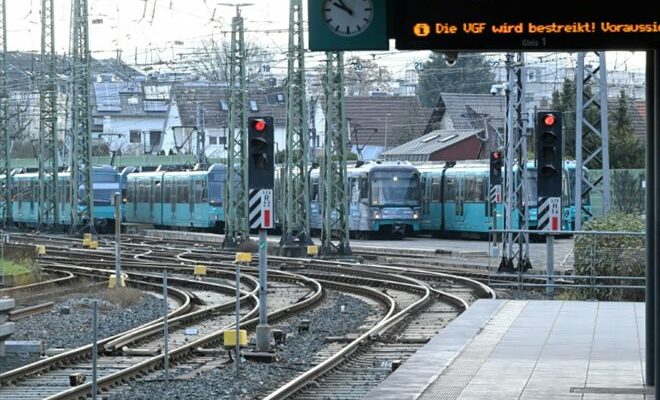A train of the German railway company Deutsche Bahn at the main station in Frankfurt am Main, January 25, 2024 (AFP/Archives/Kirill KUDRYAVTSEV)
German travelers are preparing to suffer this week after calls for strikes at Lufthansa and Deutsche Bahn, the national railway company, the latest examples of a social climate which is clearly stiffening in the country due to inflation.
These movements will further damage the image that the country has long enjoyed of social peace and peaceful resolution of conflicts between employers and staff representatives thanks to a culture of co-management inherited from the post-war period.
It seems more and more to belong to the past.
The unions’ demands relate as much to salary increases as to reduced weekly working hours.
In the airline sector, the ground staff of the leading European air transport group Lufthansa are called for a new strike from Thursday and for two days in the main German airports.
For passenger traffic, the walkouts will take place from Thursday 4:00 a.m. until Saturday 7:10 a.m., according to a press release released Monday. Many flight cancellations are to be expected.

The platforms of Frankfurt station, February 2, 2024, during a previous strike (AFP/Archives/Kirill KUDRYAVTSEV)
“No one can understand that this group is going to announce (Thursday) record annual results (…) and that the ground employees (…) no longer know how to make ends meet in the most expensive cities in Germany “, said the head of negotiations for the Verdi branch union, Marvin Reschinsky.
Verdi, who is demanding salary increases of 12.5%, or a minimum of 500 euros more per month, is toughening the movement because “Lufthansa is making us understand that it will not move until the pressure has increased” , explained Mr. Reschinsky.
– ‘Waves of strikes’ –
The train drivers’ union in Germany, GDL, has for its part announced “waves of strikes” to support demands on wages and working hours with the national company Deutsche Bahn (DB).
Discussions with management “failed”, declared GDL boss Claus Weselsky, placing the responsibility on the company and its responsible Minister for Transport, during a press conference.
Deutsche Bahn says it has made concessions of up to 13% more pay, as well as the possibility of reducing the working week by one hour from 2026.
The GDL union is acting in a “stubborn and selfish” manner because it has not obtained “the maximum of its demands”, Deutsche Bahn human resources director Martin Seiler said in a statement on Monday.
This strike, the fifth since the start of the conflict, “will have a considerable impact” on rail traffic, he added.
Starting Wednesday at 5:00 p.m. GMT for freight and Thursday at 1:00 a.m. GMT for passengers, these walkouts will last 35 hours “like the 35-hour week” without loss of pay, compared to 38 hours currently, which is at the heart of the demands. of the union, according to Mr. Weselsky.
His organization is also calling for salary increases to compensate for inflation.
“The railway (will) no longer be a reliable means of transport,” insisted the union official, with other strikes which could follow this time without the usual 48-hour notice. Enough to make it difficult for DB to develop a backup plan.
Faced with this “unforeseeable for everyone involved” situation, the GDL union is “invited to come to the negotiating table and look for solutions,” Mr. Seiler told the press.
The social partners have a “significant responsibility” towards the “millions of people who move around every day” and because the country is “in a situation of low growth”, added the spokesperson for the Ministry of Transport, Tim Alexandrin.
The latest sectoral strikes have been followed and have handicapped the largest European economy, which was already struggling.
Other conflicts are looming, particularly in chemicals, where high-risk negotiations will begin in April.
© 2024 AFP
Did you like this article ? Share it with your friends using the buttons below.




